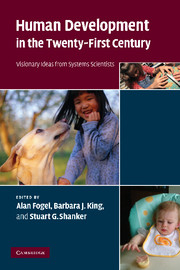Book contents
- Frontmatter
- Contents
- List of contributors
- Introduction: Why a dynamic systems approach to fostering human development?
- Part I Dynamic relationships between genetics and environments
- Part II The dynamic system of the child in the family
- 6 Relationships that support human development
- 7 The impact of emotions and the emotional impact of a child's first words
- 8 Emotional habits in brain and behavior: a window on personality development
- 9 Creating family love: an evolutionary perspective
- Part III The dynamic system of the child in social and physical environment
- Part IV Dynamic systems approaches to mental health
- Part V Conclusions and outlook
- Index
- References
7 - The impact of emotions and the emotional impact of a child's first words
Published online by Cambridge University Press: 22 September 2009
- Frontmatter
- Contents
- List of contributors
- Introduction: Why a dynamic systems approach to fostering human development?
- Part I Dynamic relationships between genetics and environments
- Part II The dynamic system of the child in the family
- 6 Relationships that support human development
- 7 The impact of emotions and the emotional impact of a child's first words
- 8 Emotional habits in brain and behavior: a window on personality development
- 9 Creating family love: an evolutionary perspective
- Part III The dynamic system of the child in social and physical environment
- Part IV Dynamic systems approaches to mental health
- Part V Conclusions and outlook
- Index
- References
Summary
Can a five-year-old child who has never said a word still learn how to speak? What about a five-year-old who can't look people in the eyes and seems locked in his own private world: is he still able to become an active social being? Or a child who is unable to control his emotions and erupts into tantrums or withdraws into himself at the slightest provocation: can such a child still learn how to self-regulate and engage with others? How about a child whose thinking is highly fragmented or who has trouble distinguishing between reality and fantasy: can such a child still become a reflective, logical thinker?
These are questions that philosophers rarely if ever address; but philosophical thinking from the past has profoundly influenced the way scientists think about these questions. There are a large number of psychologists and psychiatrists today who believe that children with the above kinds of deficits have suffered some genetic malfunction that has rendered them incapable of acquiring these capacities. And if a particular child should, through intensive therapy, develop one of these higher abilities, that doesn’t mean, according to these scientists, that we have to rethink this genetic hypothesis; rather, it means that we have to rethink how to characterize whatever the ability is that the child may have acquired.
- Type
- Chapter
- Information
- Human Development in the Twenty-First CenturyVisionary Ideas from Systems Scientists, pp. 65 - 71Publisher: Cambridge University PressPrint publication year: 2007



